- Home
- P. T. Deutermann
The Firefly Page 2
The Firefly Read online
Page 2
He sits there in the car, forcing his still-muddied brain to remember her name. Wall. Something Wall. Catherine? No. He instinctively turns his head when he hears sirens approaching up Kalorama Road. He leans sideways down into the front seat as the big engine set goes bawling by, its red and white strobes lighting up the inside of his car. The engine is pursued by a fire chief’s car, its red dome light flashing. Another engine comes up the avenue a minute later. He looks at his watch. Alarm-system call, probably. But plenty of time for the gas-oxygen mix to have done its job.
But now he must make an important detour. One woman. Shouldn’t be too hard, but still…He has her address in his computer. Sunday wasn’t the first time he’d made a nocturnal visit to the clinic, courtesy of the nurses’ sloppy security procedures. Just like every office he’d ever been in. Access codes written down in phone books. Keys and even spare keys on plainly visible hooks. He could go back to his apartment, look up the address, go there tonight even.
Another fire engine comes up Kalorama, preceded this time by a police car. Second alarm. Excellent. Big hot fire. The surgery and certainly the upstairs rooms, all fully engaged. The floor sagging. Those spare bottles puddling into nondescript slag. He waits for the fire engine to go by, checks both ways for police, and then pulls out. He goes one full block before remembering to turn his headlights back on. Damned anesthesia.
No, he decides. Not tonight. Of course he needs her dead, like the others, but he remembers the old Army maxim: If you want something bad, you’ll probably get it bad.
No. He has seven weeks until der Tag. The big day. Plenty of time to set up one final incidental kill. He will do this correctly. Go there, do a proper reconnaissance; see precisely where she lives, get inside, see about alarms, neighbors, dogs—the usual. She doesn’t know anything that can point to what’s coming, and she certainly doesn’t have his name. Assuming the records room and all its contents are destroyed, the only name that should survive the fire is the one planted deep in the metal record holder, along with the tantalizing but fragmentary transcript.
He brakes hard as some idiot Washington driver runs a red light and nearly broadsides him. He automatically looks to see if there’s a police car, officers who might have seen the criminal, but of course there isn’t one.
Because they’re busy just now, he remembers with an icy smile. And soon, very soon, they’ll really be busy.
1
THE PRETTY YOUNG SECRETARY WAS STARING AT HIM OPEN-MOUTHED, so Swamp Morgan said it again. “Special Agents Morgan and White, United States Secret Service, to see Mr. Thompson.”
“Um,” she began, then stopped, apparently still at a loss for words. Swamp’s face often had that effect.
“He is in, right?” Swamp asked, peering over her shoulder at the door of the corner office. A man could be heard inside talking on the phone. The polished brass sign on the door read C. FREER THOMPSON, DEPUTY ASSISTANT SECRETARY OF LABOR, PROCUREMENT POLICY. He rubbed his hands together and eyed the door as if anticipating smashing the thing in. He stopped when he saw the secretary getting truly alarmed.
“Yes, sir, he is,” she said, “But he’s on a teleconference call just now. I—uh—”
“Why don’t you just pass him a note that we’re here? That should do it. Okay? Special Agents Morgan and White, United States Secret Service, Department of Homeland Security.”
“And do you have an appointment, sir?” she asked, speaking to Gary White this time, trying to reassert her position as gatekeeper to a deputy assistant secretary while pretending that Swamp was a disagreeable figment of her imagination.
“Will a federal warrant do it for you?” Swamp asked quietly, raising his eyebrows meaningfully.
She blinked, then reached for a telephone message pad to write down their names. She got up, went to the big oak door, knocked once, looked back at them, and went in, shutting it behind her.
“Warrant?” White murmured. He was a new agent, mostly along for the ride this morning, to see how the legendary Swamp Morgan did a closing. He’d been assigned to another agent in the Special Investigations Unit, the man who had actually worked up the Thompson case, but that agent had come down with kidney stones, so the case and probationer White had been handed over to Morgan for the closure interview.
“Didn’t actually say I had one, did I?” Swamp murmured back. “Besides, that’s the whole point of the closure interview. The idea is to excise the bad guy before we have to paper him.”
The secretary had not returned. “What’s she doing in there?” White asked.
“Probably nothing she hasn’t done before,” Swamp said with a crooked grin.
She reappeared and motioned them to go in. Morgan tipped his head for the younger agent to precede him. Gary White was an average-size man with a boyish face, which belied his six-year former experience as a civilian police detective. Swamp Morgan wanted to watch his quarry’s reaction to his own face, especially when he saw White first. Swamp thought Gary looked to be about nineteen, so there was indeed some visible shock when C. Freer got a look at the adult member of the team. Swamp Morgan was tall, wide, and definitely not handsome.
Swamp’s real name was Terry Lee Morgan. Born and raised in Harpers Ferry, West Virginia, Terry Lee had grown quickly into one of the biggest, and homeliest, kids in town. He got his size from his father, Henry Lee Morgan, who’d started life in the coal fields before moving to Harpers Ferry to escape subterranean slavery and the black lung that came with it. From the time he was ten, Terry Lee had had an oversized head, an unruly mop of black hair, and a face that faintly resembled that of a Neanderthal, complete with shelving brow, a huge jaw, large ears, and fierce dark brown eyes. From his mother, Terry Lee had inherited a gentle disposition, a sense of humor, and startling intelligence. It hadn’t taken him long to discover that people made certain assumptions once they saw his face, and he’d been surprising people ever since, an attribute that was most useful in law enforcement. Rather than being sensitive or depressed about his appearance, Terry Lee had been having fun with his Neanderthal visage since he’d hit high school. He’d been a defensive guard both in high school and, later on, at Notre Dame, where he had often unnerved opposing quarterbacks by remaining outside the huddle, taking off his helmet, and then executing the threat display of a silverback gorilla, loping, jumping back and forth, all the while batting his own helmet back and forth rapidly between massive paws and staring pointedly at the quarterbacks’ heads. This kind of behavior had tended to unsettle the front-line meat and thereby created frequent sacking opportunities.
He didn’t acquire the nickname “Swamp” until he’d finished Notre Dame with a degree in financial management and then applied to the Federal Bureau of Investigation for a job as a special agent. During training at the FBI school down at Quantico, one of the training scenarios involved new agents setting up a sting operation by posing as a fence crew for stolen goods. The instructors posed as crooks. One of the instructors, a gorgeous redhead, took offense at the way Terry Lee was ogling her booty. She announced to the assembled crew that she would appreciate it if “Swamp Thing” over there would keep his eyes to himself. The entire cast of characters fell down on the floor laughing, including Terry Lee, who knew exactly what she was talking about. It had been “Swamp” Morgan ever since, but always with a smile, because no one wanted to offend a guy who was six three, weighed 245, and was reportedly a whole lot smarter than he looked. The name had carried over when he joined the Secret Service some years later.
The quarry today was C. Freer Thompson, Esquire, a plump double-chinned white man in his late fifties. His suit jacket was slung carelessly over the back of his executive chair, and he stood up behind an enormous mahogany desk as the agents came in. The executive office was spacious and well appointed, with floor-to-ceiling windows on the outside walls. There were two large upholstered chairs planted directly in front of the desk. Thompson’s face was slightly flushed, and he was holding some papers in his hands,
as if to emphasize the point that he was a busy man. The secretary remained standing in the open doorway, so Swamp pointedly asked her to shut the door behind her. Thompson started to say something but ended up clearing his throat instead. Swamp walked over to the desk, leaned across, and offered his hand. Thompson gave him a weak, somewhat moist handshake. Swamp sat down in one of the chairs. White, as previously instructed, remained standing.
“Mr. Thompson,” Swamp began, “I’m Special Agent Lee Morgan, United States Secret Service. This is Special Agent Gary White. We’re here to discuss your imminent resignation from government service.”
Thompson blinked and then lowered himself slowly into his chair, as if not sure it would still hold him. “Resignation?” he asked. “What are you talking about?” There was a hint of defiance in his voice, but he was clearly alarmed. Swamp could see the beginnings of white knuckles.
“Why don’t we keep this simple, Mr. Thompson?” Swamp said pleasantly. “I propose to talk, and I want you to listen carefully. I don’t want you to say anything until I’m finished, and then I want to hear you say only one thing, and that is ‘Okay, I’ll resign.’ Are we clear on that?”
“This is preposterous. Who are you? How dare you—”
Swamp interrupted. “Mr. Thompson?” He stared hard at the blustering bureaucrat, not blinking, moving his jaw as if disposing of one last bit of mastodon bone from breakfast, and widening his eyes to accentuate the glare. He noticed with satisfaction the sheen of perspiration appear on the fat man’s face. “It really is in your best interest to hear everything I have to say, Mr. Thompson. All of it, okay? Because as best I can tell from reading federal sentencing guidelines, you’re looking at right around thirty years. For someone your age, that means you’ll die in prison, doesn’t it? So, pay close attention and, above all, don’t talk. Got it, Mr. Thompson?”
Thompson looked from Swamp to White and then back at Swamp.
“Good man,” Swamp said before Thompson could open his mouth again. He then opened his briefcase and removed a fat file folder. He began thumbing through pages of material until he found his summary sheet. “The charges we have before a federal grand jury right now include multiple counts of embezzlement, contract fraud, tampering with a federal procurement-source selection board, tax evasion, racketeering, and money laundering. And that’s the preliminary list.” He looked over at Thompson. “We keep the prelim list short to expedite the grand jury process. There can and probably will be further charges. We like to layer things in these kinds of cases, in the event we get a picky judge. Clear so far?”
Thompson’s face was pale now, and all he could manage was a tiny nod. Swamp saw sweat stains spreading under Thompson’s armpits. Good, he thought. Attention achieved.
“All right,” Swamp continued pleasantly. “Here’s what we know.” He then proceeded to describe in glowing detail how the deputy assistant secretary had been fixing Labor Department systems-analysis consulting-service contracts in order to steer a few million dollars a year to a so-called Section 8A small and minority-owned business owned secretly by Thompson’s two sisters. How he’d been siphoning off two-thirds of the ensuing profits and depositing them in an offshore account, free of taxes. How he had manipulated the procurement-source selection process to cut out equally or better-qualified competing small businesses. How his special lady friend, who was not his wife, had been caught up in a Georgetown club drug sting and was ready to offer up some relevant quid on C. Freer in order to get the quo she needed to save her own admittedly delectable posterior. He casually recited a few names, dates, places, Freer’s offshore bank, and Freer’s mistress’s apartment address just to focus things.
“Now, you asked earlier who I am,” he concluded, putting the file folder back into his briefcase. “Admittedly, that’s a bit complicated. I’m a recalled U.S. Secret Service agent, on secondment to the Special Investigations Unit in the Treasury Department.”
Thompson frowned, apparently perplexed.
“Recalled,” Swamp continued, “because I’m a retired U.S. Secret Service agent. That’s right, retired. Twenty-six years, can you believe it? Careful how you answer that. Anyway, before I retired, I was a Senior Executive Service official, just like you, Mr. Thompson. SES. Well, maybe not just like you. For instance, I didn’t commit federal crimes.”
“I don’t understand,” Thompson croaked, looking to White as if the younger agent might enlighten him. Swamp saw White stare back at him, trying for a hard look but not quite managing it. Not with that baby face.
“Look at me, Mr. Thompson,” Swamp said. “Here’s how it works. The bad news is, we’ve caught you with your claws in the cookie jar. And the good news is, since we’re both old hands here, well, you must know why I’m here, right?”
Thompson frowned again for a moment and then got it. “A deal?”
Swamp smiled broadly. “See how well our little system works, Mr. Thompson?” he said. He patted the back of the fat file folder in his briefcase. “Remember that I said the evidence I just summarized was preliminary? The sad truth is, I really don’t want to work hard anymore, especially since I’ve already made it to retirement, so what we have here”—he patted the file again—“is just for openers. We can, of course, get more, lots more. We talk to people; they talk to other people. Hell, you know how it’s done, right?”
Swamp saw Thompson wince and then look down at his hand. He’d managed to cut himself on the edge of one of the papers he had been compressing. When Thompson reached into a drawer for a Kleenex, White, God love him, slipped his hand inside his coat. Thompson totally missed it, which probably avoided a humiliating intestinal dysfunction on Thompson’s part.
Swamp kept it going. He was close. He was sure of it.
“You see, Mr. Thompson, it’s Treasury’s position, and the Justice Department concurs, of course, that senior rotten apples like you give the whole government a bad name. And while we can and will happily prosecute your ass and lock you away in a federal penitentiary for years and years, sometimes, and especially when there’s been no bodily injury, no violence against persons, it can be in the government’s best interest to simply make you go ‘away,’ You getting this, Mr. Thompson? I can speak more slowly, use more one-syllable words, if you want me to.”
Thompson looked back up, swallowed, and nodded again, all the while wrapping the Kleenex around and around the paper cut on his finger.
“Good. So here are the elements of the deal: You’re going to have to make financial restitution. That means give it all back, okay? Your sisters are going to have to make financial restitution, and it’ll be your job to explain that to them. I’m sure you’ll want to do that, because it looks to us like they weren’t really part of this. Were they?…No, we didn’t think so. And, of course, you and the IRS are going to have some quality time together. You know how those guys are. And finally, you’re going to resign. As of…well, let’s see.” Swamp glanced at his watch. “Today’s the ninth of January. Happy New Year, by the way. I think you’re going to resign by close of business today, effective, let’s say, on the fifteenth of this month. For personal reasons, of course. And your resignation is absolutely going to be accepted. Did I mention that I’ve already had a word with the Secretary of Labor?…No? Well, I have. She’s waiting for your paperwork as we speak.”
He stopped to let Thompson absorb all this, or even to say something, but the man was just staring down at his desk now. Swamp couldn’t tell if he was thinking or if he was just in shock. Some of them went pretty much catatonic at this juncture. He looked over at White, who nodded and then unbuttoned his suit jacket and extracted a shiny pair of steel handcuffs. They positively glistened in his hands.
“Or,” Swamp said pointedly. White was holding the cuffs in both hands, rubbing one against the other to make a small scraping noise. Thompson looked at the cuffs, then back at Swamp.
“Okay,” he whispered. “I’ll resign.”
“There you go, Mr. Thompson. That was
n’t hard, was it? Now, we’re almost there, so let’s just nail it all down.” He reached into his briefcase and withdrew a much thinner file folder. “Here’s your resignation letter. Already typed out. On Labor Department stationery, today’s date, and everything. I want you sign it and then date it under your signature.” He handed it over.
“Now?”
“Right now. That way, there won’t be any of those pesky second thoughts. Because we well and truly have you, Mr. Thompson. And although your sisters think that this whole sweet deal was within your legal prerogative, we can have them, too. That piece of paper is the carrot, Mr. Thompson. You watch the nightly news, don’t you? So you know what the stick looks like. So sign it. And, yes, right now. Madame Secretary is waiting.”
Thompson looked at the folder, then opened it as if expecting a snake to pop out. The resignation letter was a grand total of two lines. As promised, it was on official Labor Department stationery, and all the appropriate titles were in place. “Shouldn’t I talk to my lawyer or something?” Thompson asked.
Swamp leaned back in his chair, as if disappointed. “You can certainly do that,” he replied. “You can talk to lots of lawyers if you want to. But if you don’t sign that right now, I’m going to take it back. Then we’re all going to change mode here.”
Gary White rubbed the cuffs some more. “But,” Thompson protested. “I mean, this is duress.”
“Of course it is, Mr. Thompson,” Swamp said, smiling. “Absolutely. It’s the epitome of duress. That’s the whole point of my being here. Although I have to say, if you think this is duress, wait till you go into the system. Now that’s duress.” White was nodding helpfully.

 The Nugget
The Nugget The Hooligans
The Hooligans SPIDER MOUNTAIN
SPIDER MOUNTAIN![Cold Frame [retail] Read online](http://i1.bookreadfree.com/i/03/19/cold_frame_retail_preview.jpg) Cold Frame [retail]
Cold Frame [retail] Sweepers
Sweepers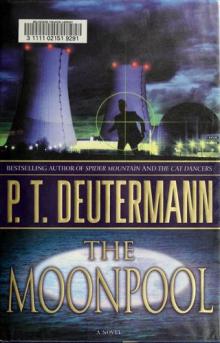 Cam - 03 - The Moonpool
Cam - 03 - The Moonpool Trial by Fire
Trial by Fire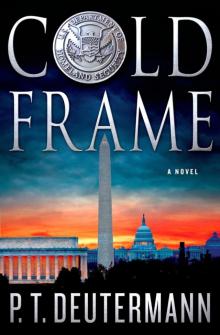 Cold Frame
Cold Frame Darkside
Darkside Cam - 04 - Nightwalkers
Cam - 04 - Nightwalkers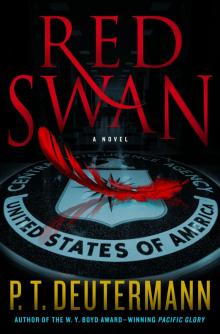 Red Swan
Red Swan The Commodore
The Commodore Hunting Season
Hunting Season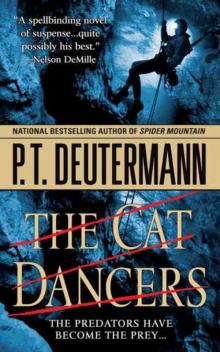 The Cat Dancers
The Cat Dancers Scorpion in the Sea
Scorpion in the Sea The Edge of Honor
The Edge of Honor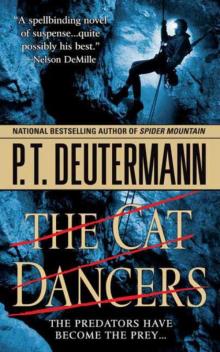 The Cat Dancers cr-1
The Cat Dancers cr-1 The Iceman
The Iceman The Iceman_A Novel
The Iceman_A Novel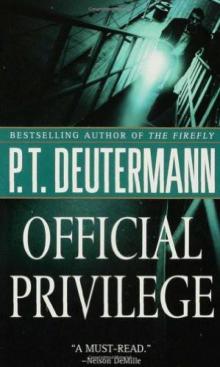 Official Privilege
Official Privilege Sentinels of Fire
Sentinels of Fire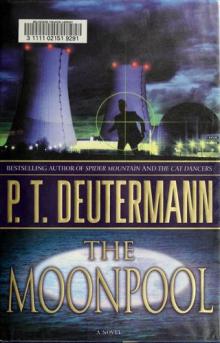 The Moonpool cr-3
The Moonpool cr-3 Nightwalkers cr-4
Nightwalkers cr-4 The Firefly
The Firefly Spider mountain cr-2
Spider mountain cr-2 Pacific Glory
Pacific Glory The Last Man
The Last Man